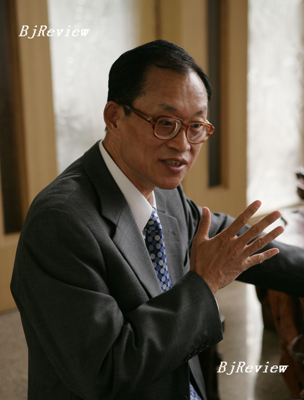
The United Nations Security Council adopted a resolution on July 31 to authorize a 26,000-strong joint African Union (AU)-UN peacekeeping force in Darfur, Sudan. Under the resolution, the hybrid operation-also known as the third phase of the Annan Plan peacekeeping program that was put forward by former UN Secretary General Kofi Annan-would be authorized for an initial period of 12 months. Shortly before this historical move, Beijing Review reporter Yan Wei talked to Liu Guijin, Special Representative of the Chinese Government for Darfur, about his vision for peace in the war-torn region.
Beijing Review: You have just returned from an international conference on Darfur in Tripoli, Libya. What new progress was made at the conference?
Liu Guijin: I attended the Tripoli international conference on July 15-16. It was the second meeting in Tripoli on the political process in Darfur. A salient feature of this meeting was that all stakeholders of the Darfur issue were represented, from the Sudanese Government to Sudan's neighbors, some Western European countries, the AU, the UN and the European Union. The conference produced an agreement on promoting the political process in Darfur. It also called for greater attention on the development and reconstruction of Darfur, while affirming that the AU and the UN, together with Sudan's neighboring countries, should be the main channel through which to promote the political process and calling on the international community not to support other initiatives.
On the sidelines of the conference, Jan Eliasson, the UN Secretary General's Special Envoy, and Salim Ahmed Salim, Coordinator of the AU to Sudan, had extensive contacts with Darfur rebel leaders. They tried to persuade them to convene in Arusha, Tanzania, to shape a common, or largely common position, so that they can negotiate with the Sudanese Government with one voice. It also was decided at the conference that the UN secretary general and the AU chairman would invite the parties concerned, including the Sudanese Government and the rebels, to a political negotiation session before the end of August.
You have paid two visits to Sudan since you assumed office and have noted that the situation in Darfur is improving. Tell us about the improvement.
The Chinese Government advocates a two-track approach to resolve the Darfur issue that attaches equal importance to the peacekeeping operation and the political process. Progress has been made on both fronts. The Tripoli conference itself is evidence of the progress in the political process. Progress in initiating the hybrid peacekeeping operation was highly recognized at the conference. In particular, the Sudanese Government announced that it would unconditionally accept the hybrid operation plan on June 12.
In addition, the humanitarian situation in Darfur is improving despite lingering problems. Eliasson said at a recent press conference in Khartoum that the so-called "genocide" is nonexistent in Darfur. Some people living in the camps are not willing to return to their homes partly because of security concerns and partly because of the fairly comfortable life in the camps.
The Sudanese Government believes that only 70 percent-80 percent of the first phase of the Annan Plan has been completed and that no substantial progress has been made in implementing the plan's second phase. How do you evaluate the implementation of the plan's first two phases?
While the Sudanese Government believes the first phase of the Annan Plan is 70 percent-80 percent complete, the UN maintains it has been fully completed. The divergence is not very prominent. It should be said that the first phase of the Annan Plan has largely been completed. In fact, the first phase is rather simple. In this phase, the UN offered the African Union Mission in the Sudan (AMIS) $24 million in assistance. The second phase has started. It includes the provision of $450 million in assistance, the improvement of the equipment and communication system of the AMIS and logistic and material preparations for the hybrid operation. At the UN's request, the Chinese Government has promised to send a 275-member engineering unit to Darfur in August. The third phase will not start until the first two phases are completed. It will take another few months. The key lies in the cooperation between the UN, the AU and the Sudanese Government. I often tell Western media that no matter whether you like the Sudanese Government or not, you have to gain its cooperation to solve the problem of Darfur.
You often say that the Darfur issue is essentially a problem of development, whereas UN Secretary General Ban Ki-moon believes ecological crisis is the root cause. Can you elaborate on the two views?
The two views are not contradictory. Severe ecological degradation is a direct cause of the resource shortage in Darfur. Since the 1970s, desertification has worsened in the north. As the nomads moved south, they ran into clashes with farmers and nomads there. Conflicts broke out as different tribes and people in the same tribe competed for land, pastures and other resources. I think Ban is right, and so are we. The Darfur issue is both an issue of ecological degradation and an issue of development. The two issues are closely linked as
| 